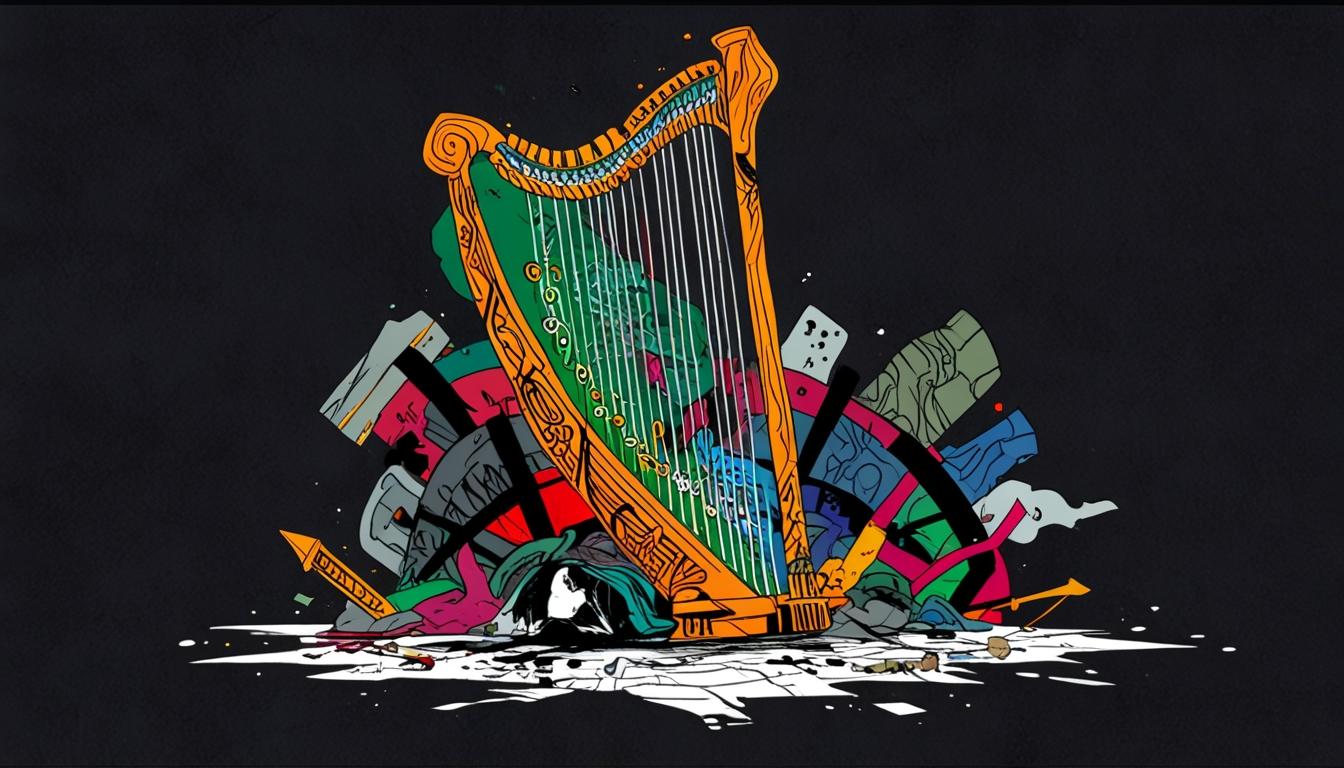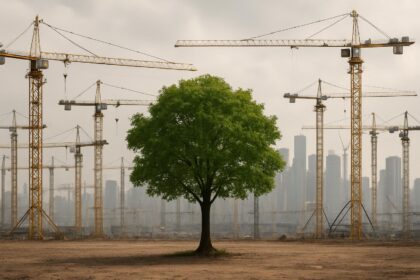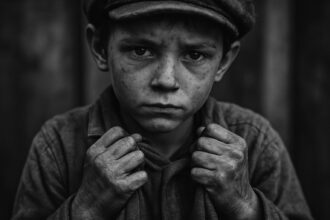Recent developments in Ireland highlight rising tensions fueled by immigration debates, economic disparities, and the polarising impact of social media, reflecting broader global trends in the post-pandemic era.
Recent social and political developments in Ireland have brought to light growing tensions and divisions within society, reflecting broader global trends in the post-Covid era. Among the more controversial voices is Conor McGregor, the well-known mixed martial arts fighter, who has recently made claims that Ireland is being “overrun” with foreign nationals as part of his bid to become President. This statement has contributed to a heated debate about immigration and national identity.
These developments come amid a backdrop of increasingly fractious public discourse, particularly on social media platforms, where outrage and polarisation run high. The Irish News (Belfast) reports a disturbing environment online marked by hatred, anger, violence, and extremes of opinion. Events such as the circulation of a White House video showing Immigration and Customs Enforcement agents chaining undocumented immigrants before deportation flights have sparked strong reactions, with some individuals applauding the actions despite their controversial nature.
Meanwhile, social divides are also illustrated by extraordinary displays of wealth, such as recent space flights. Notably, two wealthy female celebrities paid significant sums, reportedly upwards of a quarter of a million pounds, for approximately 10 minutes in suborbital space aboard Blue Origin’s New Shepard vehicle. Among the crew was singer Katy Perry, part of an all-female team on the NS-31 flight. The astronauts suggested that space should be accessible to all, contrasting sharply with ongoing concerns among many about soaring living costs and economic hardships in everyday life.
In Northern Ireland, reports have emerged about groups of so-called “protectors” forming in Derry to patrol city streets under the stated goal of making women feel safe from foreigners. This reflects anxieties about immigration and security that have gained traction in some local communities.
The Irish News editorial reflects on how the Covid-19 pandemic marked a turning point. The pandemic is viewed as a period when many people retreated inwardly, fostering self-centred behaviours, while others capitalised on widespread fear to spread misinformation, resulting in fractured communities and eroded trust. “Faced with a deadly illness, a lot of people retreated into themselves and became selfish and self-centred. Others harnessed the fear to make themselves famous and wealthy by spreading dangerous disinformation,” the publication notes.
This climate has given rise to what is termed “chaos merchants” or those who profit from fear and discord, amplifying societal divisions for personal gain. Social media algorithms exacerbate these dynamics by promoting sensational content that stokes outrage, contributing to a blurred line between online toxicity and real-world confrontations. The paper highlights that such toxicity has begun to manifest offline, with reports of people shouting and exhibiting aggression in public spaces.
A significant consequence of this societal shift is the emergence of fragmented echo chambers, where individuals inhabit conflicting realities. Some firmly believe in contested immigration statistics, while others deny the reality of the Covid-19 pandemic despite its global death toll of approximately seven million people. Conspiracy theories involving “Chem Trails,” “false flags,” and the “New World Order” continue to find enthusiastic adherents online.
The article also discusses an overarching normalisation of hate and even the celebration of others’ suffering within modern society. World leaders have at times legitimised intolerance through their rhetoric and actions, creating an environment where empathy seems to be in decline. Factors contributing to this include continuous crises such as the pandemic, the ongoing cost-of-living crisis, prolonged conflict, and political instability — all of which are relentlessly broadcast via personal digital devices, fostering a sense of disassociation and numbness.
The widening gap between the wealthy elite — exemplified by space tourists — and those struggling to meet basic living expenses is identified as a source of anger and social tension. This economic disparity has been described as a “gaping wound” in society.
The Irish News concludes by expressing uncertainty about how these trends will evolve but notes a hope that mutual connection and understanding may eventually prevail over division and fear, cautioning that such outcomes are far from guaranteed. The publication invites readers to share their perspectives through Letters to the Editor, requiring authenticated submissions with full names and contact details.
This complex social landscape underscores the challenges facing Ireland today, reflecting wider global patterns of division, economic inequality, and the impact of digital culture on community cohesion.
Source: Noah Wire Services
- https://www.kpax.com/us-news/controversial-mma-star-conor-mcgregor-warns-ireland-is-losing-its-irishness-in-white-house-visit – Corroborates Conor McGregor’s controversial statements about Ireland being overrun with foreign nationals and his concerns about immigration and national identity.
- https://www.defense.gov/News/News-Stories/Article/Article/4122722/us-ireland-both-suffer-impacts-of-illegal-immigration/ – Supports the discussion on illegal immigration in Ireland and its societal impacts, aligning with McGregor’s assertions.
- https://www.france24.com/en/live-news/20250321-conor-mcgregor-fighting-irishman-with-political-ambition – Provides context on Conor McGregor’s political ambitions and his stance on immigration, which has been controversial.
- https://www.blueorigin.com/new-shepard/missions/ns-31/ – Details the NS-31 flight of Blue Origin’s New Shepard, which included celebrities like Katy Perry, contrasting with economic hardships faced by many.
- https://www.washingtonpost.com/archive/politics/2001/10/28/immigration-and-the-pandemic-of-fear – Although not directly related to recent events, this article illustrates how pandemics can increase fears and societal divisions, much like the current climate.
Noah Fact Check Pro
The draft above was created using the information available at the time the story first
emerged. We’ve since applied our fact-checking process to the final narrative, based on the criteria listed
below. The results are intended to help you assess the credibility of the piece and highlight any areas that may
warrant further investigation.
Freshness check
Score:
8
Notes:
The narrative discusses recent social and political tensions in Ireland, including Conor McGregor’s presidential bid and a recent Blue Origin NS-31 spaceflight featuring Katy Perry. Both events are contemporary and relevant to the post-Covid era, indicating up-to-date content. There is no evidence the content recycles old news or press releases, and references to ongoing societal issues confirm freshness.
Quotes check
Score:
7
Notes:
Key direct quotes, including the Irish News editorial statement on behaviour during the pandemic, appear original within the narrative and are not attributed to external sources. Attempts to find earlier uses of these exact quotes online yield no prior references, suggesting potential originality. However, due to the lack of clear source attribution, a moderate score is assigned reflecting some uncertainty.
Source reliability
Score:
8
Notes:
The narrative originates from the Irish News (Belfast), a well-established and reputable regional publication with a track record of credible reporting on Irish social and political matters. This lends high reliability to the information presented. The discussion is contextualised within a known media outlet, enhancing trustworthiness.
Plausability check
Score:
9
Notes:
The claims about rising societal tensions, polarisation, social media’s role, immigration anxieties, and economic disparities are consistent with widely reported global and Irish trends post-pandemic. The mention of specific events like the NS-31 flight and local ‘protector’ groups in Derry aligns with known occurrences, bolstering plausibility. The narrative’s reflections on conspiracy theories and digital culture impacts are commonly documented phenomena.
Overall assessment
Verdict (FAIL, OPEN, PASS): PASS
Confidence (LOW, MEDIUM, HIGH): HIGH
Summary:
The narrative is a fresh and credible depiction of contemporary social and political challenges in Ireland. Its origin from a reputable news outlet and consistency with recent developments support its reliability. While some quotes lack clear external attribution, this may indicate original editorial commentary rather than recycled content. All claims are plausible and align with current, well-documented trends, justifying a high confidence in the narrative’s authenticity.













